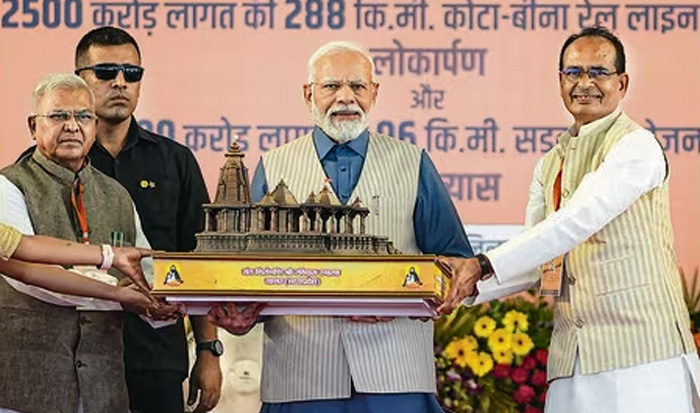Parties vie for crucial Dalit vote as high-stakes MP polls approach
A cloud of dust envelops the barren expanse of land along the Sagar-Tikamgarh highway where frantic construction is underway against the backdrop of the thinly forested Vindhya range.
Some JCBs are digging pits, others are flattening land. Steel structures have come up at three places on the four-acre plot. The work is for a temple for 13th century mystic poet Sant Ravidas, who has a huge following among Dalits in election-bound Madhya Pradesh.
On August 12, Prime Minister Narendra Modi laid the foundation stone of a temple and museum and a pilgrim centre at Badtuma village in Sagar district, which has the highest Dalit population among six districts of the Bundelkhand region. He said at the time that the temple would be one of the biggest of Sant Ravidas and highlight his teachings about equality and upliftment.
“No one has done as much for Dalit upliftment since Independence as the BJP has,” the PM said, addressing a constituency that has rallied behind the Bharatiya Janata Party in recent elections, moving away from the Bahujan Samaj Party. Before the foundation stone was laid, the state’s ruling BJP government conducted a month-long Shri Ravidas Smarak Nirman Samrasta Yatra collecting soil from 53,000 villages and water from 315 small water streams in the state for the temple.
The announcement came with a dash of controversy.
Within a day of the PM’s function, the head of Guru Ravidas Ashram in Sagar district demanded that the Sant Ravidas temple be converted into a hospital and built closer to the ashram in Karrapur village, five kms away from the temple site. “Ravidas ji never stayed at Badtuma. We requested the local administration to build a hospital instead of a temple next to Ashram as there is evidence that Sant ji stayed here,” said Pancham Das, head of the ashram, claiming that he was not even allowed to perform puja during the PM’s function. He said the ashram was built at the location where Sant Ravidas stayed during his spiritual tour around 600 years ago.
Sagar district collector Deepak Arya admitted to receiving a representation from Pancham Das to the effect and spoke of the administration’s efforts to convince him that Badtuma was the best site as it was close to the highway and has abundant vacant land. “We also told him that Karrapur, where the Ashram is situated, is in a busy locality and such a big temple will not be possible there,” he said.
The Congress was quick to leverage the issue, promising to construct a hospital in Sagar in memory of Sant Ravidas, if it came to power, and accused the BJP of trying to woo Dalits before elections. “This is a political gimmick,” Congress president Mallikarjun Kharge said a day after the PM laid foundation stone, adding that Madhya Pradesh has the highest rate of atrocities against Dalits in the country.
According to National Crime Records Bureau (NCRB) data for 2021, Madhya Pradesh has recorded the highest incidents of crime and atrocities against Dalits in India, followed by Rajasthan and Uttar Pradesh. In 2019, Rajasthan ranked the top state.
In Madhya Pradesh, of the total 230 assembly seats, 82 are reserved — 47 for Scheduled Tribes and 35 for Scheduled Castes. SC and ST households constitute 36% of the state’s population and therefore, hold an important role in deciding which party will form the government. While tribals dominate the southern and western parts of the state, Dalits are mostly concentrated in backward Bundelkhand, Vindhya and Gwalior-Chambal regions.
Analysts say Dalits supported BJP in 2003, 2008 and 2013 assembly polls, helping it form the government in the Central Indian state. Of the 35 SC seats, the BJP won 18 in 2003, 22 in 2008 and 31 in 2013. However, in 2018 the BJP won only 18 of these seats and Congress won 17. One went to BSP. “The Dalit votes that had shifted from the BSP to BJP in the last 15 years votes marginally shifted towards the Congress in 2018. This election, I expect Congress to get more Dalit votes than in 2018,” said Rajesh Gautam, a professor in Hari Singh Gaur Central University in Sagar and an expert on Dalit issues.
Local BJP leaders said that the Dalit voters are important for the party as they typically vote in a block and can influence at least 60 to 70 assembly seats in the state. The party is banking on its development programmes and celebration of Dalit icons to help its cause with them.
BJP legislator and Dalit leader, Pradeep Lahariya, said no party in the past thought about a temple for Sant Ravidas and that the state government has introduced several schemes including interest free loans for Dalit entrepreneurs aimed at the upliftment of the community. “This is not for votes. We have undertaken some policies that have benefited SC voters. We have also acted against criminal elements in the state. It is wrong to state that MP is No 1 in Dalit atrocities. The Congress is anti-Dalit,” he said.
Congress spokesperson Sandeep Sablok said the party will build a medical college-cum-hospital in the name of Sant Ravidas as being demanded by the community rather than imposing a temple on them. “Sant Ravidas ji has many temples in Sagar. We will give them what they have demanded. The BJP stands exposed on their anti-Dalit plank with high crime rate against the backwards in MP.”
The person in charge of the construction site , an employee at a Delhi based company, who refused to give his name, said the temple would be constructed by 2025. “The MP tourism department is the project proponent. The cost is ₹65 crore and we have a two-year deadline to finish all the work,” he said.

